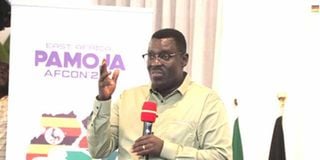East Africa federations say region will be ready in time for 2027 Afcon as Diani retreat draws roadmap

Sports Principal Secretary Peter Tum speaking during a joint stakeholders meeting for the East Africa Pamoja AFCON 2027 that brought together representatives from Kenya, Uganda and Tanzania in Diani, Kwale County. This is the first meeting held since the three countries won the bid to host the event.
What you need to know:
- Federation of Uganda Football Association (FUFA) executive committee member Rodgers Byamukama said the country has already had several engagements on what needs to be mapped and worked on.
- “A working group was established and a report is being shared with the President of Uganda together with the necessary budgets of the Afcon 27 projects,” he said.
Sports leaders in Kenya, Uganda and Tanzania have kicked off arrangements to jointly host the 2027 Africa Cup of Nations with a retreat in Diani, Kwale County, this week to deliberate on the way forward with infrastructure in the roadmap being highlighting deliberations.
Speaking to the Nation Sport during the first tri-partite meeting, Football Kenya Federation (FKF) CEO Barry Otieno said proper plans were being put in place to ensure success of the tournament.
“We are celebrating the victory against some of the established nations in football. We are also developing a framework on a roadmap on how we will move forward in terms of engagement,” he said.
The framework involves listing various processes and requirements such as infrastructure development deadlines while aligning them with the three countries to ensure a smooth operation and planning towards the event.
Earlier, Sports Cabinet Secretary Ababu Namwamba said Kenya was ready to host the event promising that the major stadiums will be ready by 2025.
Federation of Uganda Football Association (FUFA) executive committee member Rodgers Byamukama said the country has already had several engagements on what needs to be mapped and worked on.
“A working group was established and a report is being shared with the President of Uganda together with the necessary budgets of the Afcon 27 projects,” he said.
“We will be ready because the requirements that (Confederation of African Football) CAF needs are not insurmountable. We just need to now put into a structure that allows us to deliver on the commitments that we have to CAF on whose basis the award was given,” he added.
He noted that for the infrastructure, the three countries already have existing stadiums, international airports and hospitals and only the rehabilitations would need to be done especially for the stadiums.
“Kenya has Kasarani and Nyayo and it’s only the softer issues that need to be solved. The Talanta Complex will be the main stadium but if it is not ready by then, we already have the other two,” said Byamukama.
He said that in Tanzania, the Benjamin Mkapa Stadium and Abed Karume Stadium are available, while in Uganda, the Namboole Stadium is under renovation while Nakivubo is also almost complete, despite plans to build two more stadiums.
“The three governments should stop talking and fast track the infrastructure, especially in stadium building. It is high time we stopped seeing designs because it is the key component. A lot of people are pessimistic that it may not happen but once they see actual work happening it will be able to appease their sentiments and pessimism,” said Byamukama without mincing words.
Tanzania Football Federation (TFF) President Wallace Karia equally said that issues of infrastructure should be sorted to abide by the CAF deadline on preparedness and hosting the matches.
The meeting was the first to give a glimpse of what each partner state is doing and how best coordination should be done since the bid was given jointly.
The partners agreed that they will be meeting quarterly for further arrangements.





